Dresden Frauenkirche

The Dresden Frauenkirche (German: Dresdner Frauenkirche, literally Church of Our Lady) is a Lutheran church in Dresden, Germany.
Built in the 18th century, the church was destroyed in the firebombing of Dresden during World War II. It has been reconstructed as a landmark symbol of reconciliation between former warring enemies. The reconstruction of its exterior was completed in 2004, its interior in 2005 and, after 13 years of rebuilding, the church was reconsecrated on 30 October 2005 with festive services lasting through the Protestant observance of Reformation Day on 31 October.
Once a month, an Anglican Evensong in English is held in the Church of Our Lady, with clergy sent from St. George's Anglican Chaplaincy in Berlin.
Contents |
History
_006.jpg)
The Church of Our Lady was built as a Lutheran (Protestant) parish church or city church, even though Saxony's Prince-elector, Frederick August I, was Catholic.
The original Baroque church was built between 1726 and 1743 and was designed by Dresden's city architect George Bähr who did not live to see the completion of his greatest work. Bähr's distinctive design for the church captured the new spirit of the Protestant liturgy by placing the altar, pulpit, and baptismal font directly centered in view of the entire congregation.
In 1736, famed organ maker Gottfried Silbermann built a three-manual, 43-stop instrument for the church. The organ was dedicated on 25 November and Johann Sebastian Bach gave a recital on the instrument on 1 December.

The church's most distinctive feature was its unconventional 96 m-high dome, called die Steinerne Glocke or "Stone Bell". An engineering feat comparable to Michelangelo's dome for St. Peter's Basilica in Rome, the Frauenkirche's 12,000-ton sandstone dome stood high resting on eight slender supports. Despite initial doubts, the dome proved to be extremely stable. Witnesses in 1760 said that the dome had been hit by more than 100 cannonballs fired by the Prussian army led by Friedrich II during the Seven Years' War. The projectiles bounced off and the church survived.
The completed church gave the city of Dresden a distinctive silhouette, captured in famous paintings by Bernardo Bellotto, a nephew of the artist Canaletto (also known by the same name), and in Dresden by Moonlight by Norwegian painter Johan Christian Dahl.
In 1849 the church was at the heart of the revolutionary disturbances known as the May Uprising. It was surrounded by barricades, and fighting lasted for days before those rebels who had not already fled were rounded up in the church and arrested.
For more than 200 years, the bell-shaped dome stood over the skyline of old Dresden, dominating the city.
Burials include Heinrich Schütz and George Bähr.
Destruction
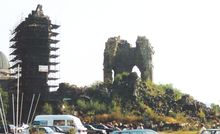
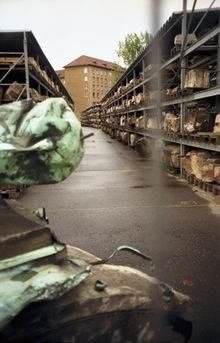
On 13 February 1945, Anglo-American allied forces began the bombing of Dresden. The church withstood two days and nights of the attacks and the eight interior sandstone pillars supporting the large dome held up long enough for the evacuation of 300 people who had sought shelter in the church crypt, before succumbing to the heat generated by some 650,000 incendiary bombs that were dropped on the city. The temperature surrounding and inside the church eventually reached 1,000 degrees Celsius.[1] The dome finally collapsed at 10 a.m. on 15 February. The pillars glowed bright red and exploded; the outer walls shattered and nearly 6,000 tons of stone plunged to earth, penetrating the massive floor as it fell.
The altar, a relief depiction of Jesus’ agony in the Garden of Gethsemane on the Mount of Olives by Johann Christian Feige, was only partially damaged during the bombing raid and fire that destroyed the church. The altar and the structure behind it, the chancel, were among the remnants left standing. Features of most of the figures were lopped off by falling debris and the fragments lay under the rubble.
The building vanished from Dresden's skyline, and the blackened stones would lie in wait in a pile in the center of the city for the next 45 years as Communist rule enveloped what was now East Germany. Shortly after the end of World War II, residents of Dresden had already begun salvaging unique stone fragments from the Church of Our Lady and numbering them for future use in reconstruction. Popular sentiment discouraged the authorities from clearing the ruins away to make a car park. In 1966, the remnants were officially declared a "memorial against war", and state-controlled commemorations were held there on the anniversaries of the destruction of Dresden.
In 1982, the ruins began to be the site of a peace movement combined with peaceful protests against the East German regime. On the anniversary of the bombing, 400 Dresdeners came to the ruins in silence with flowers and candles, part of a growing East German civil rights movement. By 1989, the number of protesters in Dresden, Leipzig and other parts of East Germany had increased to tens of thousands, and the wall dividing East and West Germany toppled. This opened the way to the reunification of Germany.
Promoting reconstruction and funding
There had already been intentions to rebuild the church during the last months of World War II. However, due to political circumstances in the GDR, the reconstruction later came to a halt. The heap of ruins was conserved as a war memorial within the inner city of Dresden, as a direct counterpart to the ruins of Coventry Cathedral, which was destroyed by German bombing in 1940 and also serves as a war memorial in the United Kingdom. Because of the continuing decay of the ruins, Dresden decided in 1985 (after the Semperoper was finally finished) to rebuild the Church of Our Lady after the completion of the reconstruction of the Dresden castle.
After the reunification of Germany, efforts were revived. In 1989, a 14-member group of enthusiasts headed by Ludwig Güttler, a noted Dresden musician, formed a Citizens' Initiative. From that group emerged a year later "The Society to Promote the Reconstruction of the Church of Our Lady", which began an aggressive private fund-raising campaign. The organisation grew to over 5,000 members in Germany and 20 other countries. A string of German auxiliary groups were formed, and three promotional organisations were created abroad.
The project gathered momentum. As hundreds of architects, art historians and engineers sorted the thousands of stones, identifying and labeling each for reuse in the new structure, others worked to raise money.
Günter Blobel, a German-born American, saw the original Church of Our Lady as a boy when his refugee family took shelter in a town just outside of Dresden days before the city was bombed. In 1994, he became the founder and president of the nonprofit "Friends of Dresden, Inc.", a United States organization dedicated to supporting the reconstruction, restoration and preservation of Dresden's artistic and architectural legacy. In 1999, Blobel won the Nobel Prize for medicine and donated the entire amount of his award money (nearly US$1 million) to the organization for the restoration of Dresden, to the rebuilding of the Frauenkirche and the building of a new synagogue. It was the single largest individual donation to the project.
In Britain, the Dresden Trust has the Duke of Kent as its royal patron and the Bishop of Coventry among its curators. Dr. Paul Oestreicher, a canon emeritus of Coventry Cathedral and a founder of the Dresden Trust, wrote [1] "The church is to Dresden what St. Paul's [Cathedral] is to London". Additional organizations include France's Association Frauenkirche Paris, Switzerland's Verein Schweizer Freunde der Frauenkirch, among others.
Rebuilding the church cost €180 million. Dresdner Bank financed more than half of the reconstruction costs via a "donor certificates campaign", collecting almost €70 million after 1995. The bank itself contributed more than seven million euros, including more than one million donated by its employees. Over the years, thousands of watches containing tiny fragments of Church of Our Lady stone were sold, as were specially printed medals. One sponsor raised nearly €2.3 million through symbolic sales of individual church stones.
Funds raised were turned over to the "Frauenkirche Foundation Dresden", the actual rebuilder, backed by the State of Saxony, the City of Dresden and the Evangelical Lutheran Church of Saxony.
Reconstruction
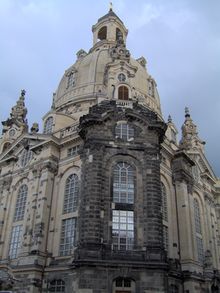
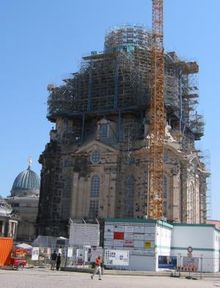
Using original plans used by builder Georg Bähr in the 1720s, reconstruction finally began in January 1993 under the direction of church architect and engineer Eberhard Burger. The foundation stone was laid in 1994, the crypt was completed in 1996 and the inner cupola in 2000.
As far as possible, the church – except for its dome – was rebuilt using original material and plans, with the help of modern technology. The heap of rubble was documented and carried off stone by stone. The approximate original position of each stone could be determined from its position in the heap. Every usable piece was measured and catalogued. A computer imaging program that could move the stones three-dimensionally around the screen in various configurations was used to help architects find where the original stones sat and how they fit together.
Of the millions of stones used in the rebuilding, more than 8,500 original stones were salvaged from the original church and approximately 3,800 reused in the reconstruction. As the older stones are covered with a darker patina, due to fire damage and weathering, the difference between old and new stones will be clearly visible for a number of years after reconstruction.
Two thousand pieces of the original altar were cleaned and incorporated into the new structure.
The builders relied on thousands of old photographs, memories of worshippers and church officials and crumbling old purchase orders detailing the quality of the mortar or pigments of the paint (as in the 18th century, copious quantities of eggs were used to make the color that provides the interior its almost luminescent glow).
When it came time to duplicate the oak doors of the entrance, the builders had only vague descriptions of the detailed carving. Because people (especially wedding parties) often posed for photos outside the church doors, they issued an appeal for old photographs and the response—which included entire wedding albums—allowed artisans to recreate the original doors.
The new gilded orb and cross on top of the dome was forged by Grant Macdonald Silversmiths in London using the original 18th-century techniques as much as possible. It was constructed by Alan Smith, a British goldsmith from London whose father, Frank, was a member of one of the aircrews who took part in the bombing of Dresden.[2] Before travelling to Dresden, the cross was exhibited for five years in churches across the United Kingdom including Coventry Cathedral, Liverpool Cathedral, St Giles Cathedral in Edinburgh and St Paul's Cathedral in London. In February 2000, the cross was ceremonially handed over by The Duke of Kent,[1] to be placed on the top of the dome a few days after the 60th commemoration of D-Day on 22 June 2004.[3] The external structure of the Frauenkirche was completed. For the first time since the last war, the completed dome and its gilded cross grace Dresden's skyline as in centuries prior. The cross that once topped the dome, now twisted and charred, stands to the right of the new altar.
Seven new bells were cast for the church. They rang for the first time for the Pentecost celebration in 2003.
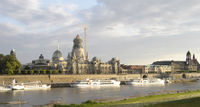

It was decided not to reproduce a replica of the Silbermann organ. The decision resulted in the Dresden organ dispute ("Dresdner Orgelstreit"). A 4,873 pipe organ was built by Daniel Kern of Strasbourg, France, and completed in April 2005. The Kern organ contains all the stops which were on the stoplist of the Silbermann organ and tries to reconstruct them. Additional stops also are included, especially a fourth swell manual in the symphonic 19th century style which is apt for the organ literature composed after the baroque period.
A bronze statue of reformer and theologian Martin Luther, which survived the bombings, has been restored and again stands in front of the church. It is the work of sculptor Adolf von Donndorf from 1885.
The intensive efforts to rebuild this world famous landmark were completed in 2005, one year earlier than originally planned, and in time for the 800-year anniversary of the city of Dresden in 2006. The church was reconsecrated with a festive service one day before Reformation Day. The rebuilt church is a monument reminding people of its history and a symbol of hope and reconciliation.
There are two devotional services every day and two liturgies every Sunday. From October 2005 through the year 2010, there is an exhibition on the history and reconstruction of the Frauenkirche at the Stadtmuseum (City Museum) in Dresden's Alten Landhaus.

Since the re-opening
Since re-opening, the Church of Our Lady has been a hugely popular tourist destination in Dresden. In the first three years after the re-opening, seven million people have visited the church.[4] The project has inspired other revitalization projects throughout Europe. Christian services are again available. In 2009 the church was visited by US President Barack Obama after a meeting with German Chancellor Angela Merkel in the Grünes Gewölbe.
Criticisms of reconstruction methods
One historian[5] complained that unidentifiable parts of the ruins were placed in arbitrary locations in the new building. As a result, he claimed that the "Socialist monument [to the bombing] was ... dispersed throughout the fabric of the building".
See also
- Royal Castle, Warsaw
- Cathedral of Christ the Saviour (Moscow)
References
- ↑ 1.0 1.1 BBC News | UK | Duke leads Dresden tribute
- ↑ BBC News | UK | Dresden Cross presented at Windsor
- ↑ BBC NEWS | World | Europe | Dresden ruins finally restored
- ↑ http://www.deafvision.de/nachrichten/politik/7-mio-besucher-dresdner-frauenkirche
- ↑ Mark Jarzombek: "Disguised Visibilities: Dresden/"Dresden." Memory and Architecture, Ed. By Eleni Bastea, (University of Mexico Press, 2004), p.56.
External links
- Frauenkirche Dresden Official German website. Includes historical and current pictures.
- The Frauenkirche - a page from the Library of Congress website, from which part of this article was copied
- Live Webcam showing the Frauenkirche
- Hourly webcam pictures from the Neumarkt square, with the construction history in pictures
- Gunther Blobel's autobiography
- Homepage of the "Gesellschaft Historischer Neumarkt Dresden e.V." (Society for the rebuilding of the Historical Neumarkt Dresden)